College Sports
Male NCAA gymnast gives insane take on Simone Biles vs. men
An NCAA gymnast launched himself into the debate about male athletes in women’s sports following Olympian Simone Biles’ remarks about activist Riley Gaines. Samuel Phillips, a gymnast at the University of Illinois Urbana-Champaign, weighed in on Biles’ remarks after she called Gaines a “sore loser” for losing to a man (Lia Thomas) and “truly sick” […]

An NCAA gymnast launched himself into the debate about male athletes in women’s sports following Olympian Simone Biles’ remarks about activist Riley Gaines.
Samuel Phillips, a gymnast at the University of Illinois Urbana-Champaign, weighed in on Biles’ remarks after she called Gaines a “sore loser” for losing to a man (Lia Thomas) and “truly sick” for campaigning against the inclusion of men in women’s sports.
Phillips not only piled on and threw more insults at Gaines, but he also made a bold claim about how Biles would fair in competitions against men.
‘She would actually STEAL GOLDS from LOTS of the best Male floor and vault workers.’
“This whole fight between Riley and Simone is NULL & VOID because the basis of the right’s attack is that she would lose medals in the men’s gym category,” Phillips wrote on X. “When in reality, she would actually STEAL GOLDS from LOTS of the best Male floor and vault workers. So their base is FLAWED.”
Blaze News reached out to Jennifer Sey, a seven-time U.S. women’s national artistic gymnast, to ask for her thoughts on how Biles would perform against men.
“I think it speaks more so to the fact that women’s gymnastics has changed. It’s about power not grace and flexibility,” Sey replied.
RELATED: She’s never had to compete against a man’: Female athletes respond to Simone Biles’ pro-trans rant
The XX-XY Clothing founder told Blaze News that now that men’s and women’s gymnastics are less differentiated than before, men would be “much more likely to be able to compete in women’s and win.”
Sey added, “What Phillips states is unknowable, but he’s not wrong that Simone’s skill level is otherworldly. That doesn’t change the fact that men are stronger and more powerful overall, and if men entered women’s gymnastics, they would displace women from medals and team spots.”
Following his remarks about how well Gaines would do against men, Phillips launched his own attacks at Gaines on X, as well.
“Also Null and Void because Riley G.B. is in fact an evil spirited, loser mentality, unreliable, misinformed, hateful person.”
Phillips then turned off replies to his remarks, while lashing out at Republicans on X.
“Muting the replies because every Maga cult member who comments on this has Baseless Arguments so elementary and rooted in fear. Nothing to debate about. You’re just here to fight and insight [sic] violence. Goodbye.”
Although Biles issued an apology to Gaines, and Phillips shared it, he did not issue an apology or retraction of his own.
RELATED: Simone Biles apologizes to Riley Gaines for ‘personal’ attack but still falls short of admitting the obvious
In response to Biles’ apology, Gaines said that while she accepted it, she thought some of the gymnast’s ideas were “nonsensical.”
Gaines welcomed Biles to fight alongside her in the fight to “support fair sports.”
Biles has not issued anymore public comments, and her press team has not responded to multiple requests for comment from Blaze News.
Like Blaze News? Bypass the censors, sign up for our newsletters, and get stories like this direct to your inbox. Sign up here!
College Sports
Warroad’s Payton Rolli finds right fit, familial connections with commitment to Minnesota – Grand Forks Herald
WARROAD, Minn. — Payton Rolli was already considering a commitment to Minnesota before she visited campus on Tuesday to meet with the coaching staff. Both of Rolli’s parents attended the university. Growing up, she made multiple trips from her hometown of Minot to catch sporting events on campus. She’s watched Gophers women’s hockey games, more […]
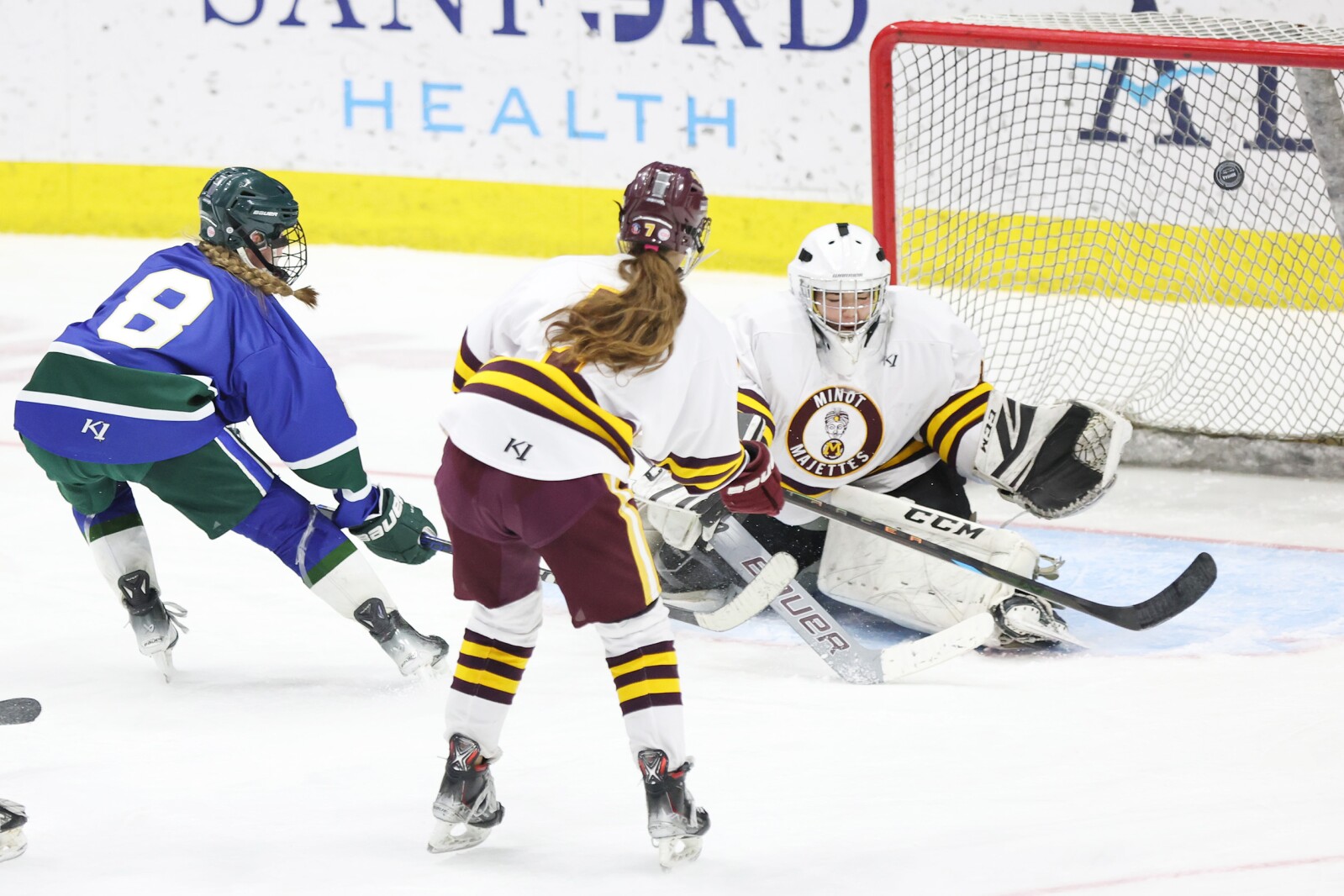
WARROAD, Minn. — Payton Rolli was already considering a commitment to Minnesota before she visited campus on Tuesday to meet with the coaching staff.
Both of Rolli’s parents attended the university. Growing up, she made multiple trips from her hometown of Minot to catch sporting events on campus. She’s watched Gophers women’s hockey games, more recently enthralled by one of the more electrifying players in college hockey, Abbey Murphy.
“I was kind of thinking about it, but going to the campus kind of made me want to go there even more,” the Warroad High standout goaltender said. “It’s crazy. Some of the people I met yesterday, it was just shocking to see them in person.”
Rolli verbally committed to the Gophers on Tuesday, wrapping up the recruiting process ahead of her senior season with the Warriors.
“It’s a dream,” said Rolli, who also made unofficial visits to Boston-area schools. “(My parents) were also really happy for me to go there. … I can’t wait. It’s a great school to be going to.”
The coaching staff, players and facilities made a strong impression on Rolli during her visit.
“The girls and the coaches (stood out),” Rolli said. “The coaches are great people. They’re the nicest to everyone, and the facilities are also really nice there. It’s just a great school.”
Rolli is coming off a
stellar junior campaign with the Warriors
. She finished the year with a 1.15 goals-against average, a .943 save percentage and nine shutouts. Rolli posted an overall record of 26-4.
It was a clear improvement from her already impressive sophomore season (1.57 goals-against average, .923 save percentage and four shutouts).
Rolli also has a strong track record in the postseason. She racked up 61 saves in this year’s Class A State Tournament semifinal tilt against Orono, propelling Warroad to its fourth-straight state championship appearance and its eventual runner-up finish.
In 2024, she backstopped the Warriors en route to their third-straight state title win, recording 26 saves in the championship game against Holy Angels.
With her commitment out of the way, Rolli is ready to pour her focus into her final season of prep hockey.
“I think it’s going to make my last year more great,” Rolli said. “(It’s) a little more relaxing not having to worry about that and being able to focus only on high school.”
Though last year’s stats won’t be easy to top, Rolli intends to continue her trend of year-by-year improvement while preparing for the next step in her athletic career.
“(I want) to do better than I did last year,” Rolli said. “I would say that, just getting more comfortable with my playing, working hard over the summer to make myself better.”
Alex Faber is a sports reporter for the Grand Forks Herald. A Michigan transplant, he graduated from Michigan State University in 2024 with a degree in journalism and minors in history and environmental studies.
College Sports
House attorneys slam NCAA and power conferences over denied NIL deals, issue legal warning about settlement
In another twist in college athletics’ new revenue-share era, attorneys for the plaintiffs in the House settlement believe the NCAA and power conferences are violating terms of the legal agreement and are threatening to report the wrongdoing to the court. In a terse, two-page letter sent to NCAA and power conference officials Friday, Jeffrey Kessler, […]
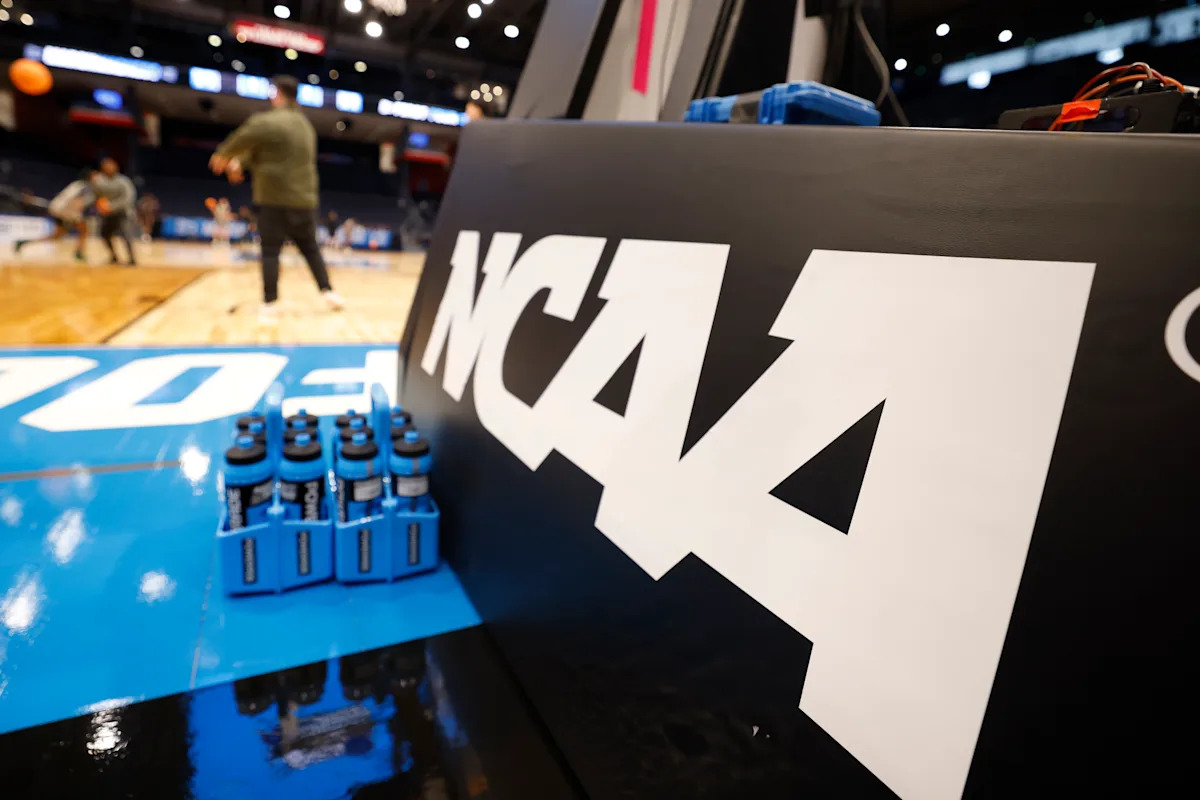
In another twist in college athletics’ new revenue-share era, attorneys for the plaintiffs in the House settlement believe the NCAA and power conferences are violating terms of the legal agreement and are threatening to report the wrongdoing to the court.
In a terse, two-page letter sent to NCAA and power conference officials Friday, Jeffrey Kessler, a co-lead House plaintiff attorney along with Steve Berman, requested that the NCAA and conferences “retract” a statement of guidance released Thursday from the College Sports Commission and, presumably, reinstate name, image and likeness deals that the CSC has denied — many of them from booster-backed NIL collectives.
Advertisement
In his letter, Kessler describes the guidance as “not consistent” and “undermining” settlement terms, according to a copy of the document Yahoo Sports obtained. The CSC, the new revenue-share enforcement arm policing NIL deals, notified schools Thursday that it was denying dozens of NIL deals for not meeting what it terms a “valid business purpose.” The guidance specifically targeted collectives, entities that for years now have paid millions to athletes through booster donations.
In the letter, attorneys write that collectives should not be treated differently as other businesses.
“There is nothing in the Settlement Agreement to permit (NCAA and conference) or the CSC, acting on their behalf, to decide that it would not be a valid business purpose for a school’s collective to engage in for-profit promotions of goods or services using paid-for student-athlete NIL,” the letter reads. “To the extent the NIL payment is for the promotion of a valid business purpose, it is irrelevant whether that payment comes from a NIL collective or any other third party.”
Attorneys are planning to bring the issue before Judge Nathanael Cousins, the appointed magistrate in the settlement who has been appointed to resolve such disputes.
Advertisement
“We urge the CSC to retract the July CSC Memorandum and clarify that the valid business purpose requirement applies to NIL collectives in the same manner as any other entity,” the letter reads.
The letter was addressed specifically to the NCAA’s outside counsel, Rakesh Kilaru, the organization’s lead attorney and one of the key designers of the settlement. Copied on the letter were the general counsels of the Big Ten, Big 12, SEC, ACC and Pac-12 — all named defendants in the case.
In a statement to Yahoo Sports, an NCAA spokesperson said the association has “no role in these decisions” and to seek comment from the CSC.
A CSC spokesperson provided this statement to Yahoo Sports: “The guidance issued by the College Sports Commission yesterday is entirely consistent with the House settlement and the rules that have been agreed upon with class counsel. The defendants have been in close coordination with class counsel on the key provisions in the memo and will continue to work with them to resolve any concerns they may have.”
Advertisement
In the letter, Kessler notes that the “valid business purpose” rule in the settlement “was meant to prohibit NIL collectives from simply receiving donations and paying athletes for play,” it reads. “It does not, however, prohibit a NIL collective from paying athletes itself — not as a marketing agent for others — if the payment is ‘for a valid business purpose’ related to the promotion or endorsement of goods or services provided to the general public for profit.”
Some of the collective deals paid athletes to attend autograph signings or make event appearances for payment — all of which should be deemed legal, according to the letter.
Advertisement
This issue is not insignificant. In fact, prohibiting collective pay is at the center of the House settlement, a multi-billion dollar agreement the NCAA and power leagues struck to settle three antitrust cases.
The goal of the agreement, in part, is to shift athlete pay from booster-run collectives to schools that are now permitted to directly share revenue with athletes under a capped system that began July 1. However, many schools are still operating their collectives as a way to provide third-party compensation to athletes that does not count against a program’s cap — a way to, perhaps, legally circumvent the system.
The College Sports Commission, an entity created and currently administered by the power conferences, is charged with enforcing prohibitions around collective pay. Athletes must submit any third-party deal of $600 or more to an NIL clearinghouse, NIL Go, that uses a Deloitte-created algorithm to determine if the deal meets certain standards, including a “compensation range” and a “valid business purpose” definition.
Those deals flagged by NIL Go are sent to the CSC and its new leader, Bryan Seeley, to determine an enforcement decision. As of Thursday, about 80 of more than 2,000 submitted deals have not been cleared, with several more denials expected this week based on the commission’s latest guidance. More than 1,500 deals have been approved.
College Sports
House attorneys argue plan to vet NIL collective deals violates settlement
The attorneys who negotiated a $2.8 billion lawsuit settlement with the NCAA and four power conferences took issue Friday with the way college sports’ new enforcement body plans to vet name, image and likeness payments to athletes from school-affiliated collectives. In a letter to the power conferences and NCAA, obtained by The Athletic, attorneys Jeffrey […]

The attorneys who negotiated a $2.8 billion lawsuit settlement with the NCAA and four power conferences took issue Friday with the way college sports’ new enforcement body plans to vet name, image and likeness payments to athletes from school-affiliated collectives.
In a letter to the power conferences and NCAA, obtained by The Athletic, attorneys Jeffrey Kessler and Steve Berman stated that the guidance the College Sports Commission (CSC) issued Thursday violates the terms of the settlement and that it should treat collectives the same as any other third-party business.
“While we want to continue to work together to implement the Settlement Agreement in a cooperative fashion, this process is undermined when the CSC goes off the reservation and issues directions to the schools that are not consistent with the Settlement agreement terms,” the letter said.
Yahoo! Sports first reported the plaintiffs’ attorneys’ letter.
“We urge the CSC to retract the July CSC Memorandum and clarify that the valid business purpose requirement applies to NIL collectives in the same manner as any other entity,” the letter said. “If the CSC does not retract the statement, Class Counsel will have no choice but to pursue relief from the Special Master as the July CSC Memorandum is already causing injury to class members.”
Kessler declined to comment when The Athletic contacted him.
Earlier Friday, the judge overseeing the settlement approved about $750 million in fees for the NCAA and conferences to pay the plaintiffs’ attorneys.
The recently approved House settlement, which took effect on July 1, established a clearinghouse, called NIL Go, that must approve all third-party deals over $600. The two main requirements for those deals are that they’re for a “valid business purpose” and fit within a fair-market “range of compensation.”
Officials created those rules to prevent schools from utilizing booster-driven entities to funnel payments to recruits and transfers as a way to work around the $20.5 million revenue-sharing cap.
“The guidance issued by the College Sports Commission yesterday is entirely consistent with the House settlement and the rules that have been agreed upon with Class Counsel. The defendants have been in close coordination with Class Counsel on the key provisions in the memo and will continue to work with them to resolve any concerns they may have,” the CSC said in a statement.
Officials for the Southeastern Conference, Big Ten, Big 12 and Atlantic Coast Conference established the CSC to oversee the revenue-sharing system the settlement created. Schools will be able to directly pay their athletes up to $20.5 million this year.
The NCAA has no involvement with the CSC, enforcement of rules related to the revenue-sharing system or the approval of NIL deals.
Guidance the CSC issued Thursday said “an entity with a business purpose of providing payments or benefits to student-athletes or institutions, rather than providing goods or services to the general public for profit, does not satisfy the valid business purpose requirement set forth in NCAA Rule 22.1.3.”
It then cited an example of a collective that “reach(es) a deal with a student-athlete to make an appearance on behalf of the collective at an event, even if that event is open to the general public, and the collective charges an admission fee (e.g., a golf tournament). … The same collective’s deal with a student-athlete to promote the collective’s sale of merchandise to the public would not satisfy the valid business purpose requirement for the same reason.”
“Today’s commentary from the College Sports Commission regarding ‘true NIL’ and ‘valid business purposes’ is not only misguided but deeply dismissive of the collective organizations and the tens of thousands of fans and donors who fuel them,” The Collective Association, a trade group of prominent collectives from around the country, said in a statement. “Any attempt to delegitimize the role collectives play in today’s collegiate athletics landscape ignores both legal precedent and economic reality.”
In the four years since NIL payments began in 2021, collectives affiliated with specific schools have made hundreds of millions in deals with athletes just like those the CSC described in its examples. They pool funds from donors and boosters and use them to license the NIL rights of specific athletes in exchange for appearances and social media posts.
“There is nothing in the Settlement Agreement to permit Defendants or the CSC, acting on their behalf, to decide that it would not be a valid business purpose for a school’s collective to engage in for-profit promotions of goods or services using paid-for student-athlete NIL,” the letter said.
(Photo: Isaiah Vazquez / Getty Images)
College Sports
Charles Barkley mum on Auburn football’s 2025 season at the American Century Championship
Stateline, NV — With TV cameras and an overzealous TV reporter swarming, I got a quick interaction with Charles Barkley at the 2025 American Century Championship Celeb Am on Thursday. I gave him a “War Eagle” and asked him his prediction for Auburn football’s 2025 slate, to which he shrugged and said he didn’t know […]

Stateline, NV — With TV cameras and an overzealous TV reporter swarming, I got a quick interaction with Charles Barkley at the 2025 American Century Championship Celeb Am on Thursday.
I gave him a “War Eagle” and asked him his prediction for Auburn football’s 2025 slate, to which he shrugged and said he didn’t know before trying to escape me and the other media members in pursuit.
Sporting a backwards hat and smoking a cigar, Barkley likely wasn’t thinking about his alma mater’s upcoming campaign on the gridiron.
Not after a disastrous June sent the Tigers’ 2026 recruiting class spiraling down into the bottom third of the entire FBS.
Besides, Barkley is a 7,500-to-1 underdog to win the tournament. His results are the most popular prop bet. He needs practice swings, not to give soundbites to everyone who wants one. Unfortunately for Barkley, he didn’t get any real ones at the driving range before the 90+ celebrities in the tournament headed out in their Celeb Am pairings.
Every July, with the Sierra Mountains hugging the horizon, the spotlight will always be on Barkley’s golf swing.
Auburn football is the least of his worries out on Lake Tahoe. Not to mention the scenery and casinos around the Edgewood Tahoe Resort, where the American Century Championship — which is airing today through Sunday on NBC, Peacock, and the GOLF Channel — is annually held.
And to be fair, Hugh Freeze doesn’t sound overly confident about what the season will look like.
NIL making Auburn’s future murky, like the rest of college football
Freeze admitted to David Pollack he doesn’t know how things will go come August 1, when NIL will have a more definitive set of guidelines.
“There are just a lot of dynamics into it right now,” Freeze prefaced before saying, “I’m confident that our staff–we have not changed a single approach with our recruiting, people love it when they come to Auburn. But, there are just a lot of dynamics that go into their decisions currently. Come August 1, everybody has to put this in writing now and we will see where everything shakes out after that. How in the world are you going to convince a third 5-star quarterback to come to you when you have Jackson Arnold and Deuce Knight? If we’re really operating under a true salary cap where we have no idea what an NIL value is until they decide that, which is our interpretation of the new rules, how do you do that?”
If Freeze sounds so unsure of the future, why would Sir Charles be any different?
College Sports
Recruiting, FSU golf shining, Basketball, and more
Florida State news continues to change daily as multiple sports shift through the news cycle. This offseason might have been the worst I can remember with this fan base. However, it feels like the recruiting momentum the staff captured over the past few weeks has brought new life to the program. I’m sure it’s that, […]

Florida State news continues to change daily as multiple sports shift through the news cycle. This offseason might have been the worst I can remember with this fan base. However, it feels like the recruiting momentum the staff captured over the past few weeks has brought new life to the program.
I’m sure it’s that, and we’ll have FSU football next month. FSU had some big recruiting news last week and has several prospects that expect to make announcements this weekend. Will the Noles miss on two tight-end targets? Will they land their first defensive end in this recruiting cycle?
Another trusted advanced metric option says the Noles will likely exceed expectations in 2025.
A former Heisman Winner’s younger brother says his recruitment is wide open. Will he land with the Noles? The FSU/Alabama game is already sold out?
UPDATE: Florida State football’s 2025 season opener versus Alabama is sold out.
#GoNoles pic.twitter.com/Dohm5JAivH
— Norvell Central (@CentralNorvell) July 10, 2025
Incoming freshman Haley Davis finished in second place at the AJGA Huntsville Junior Championship with scores of 76-65-72 for a three round total of 213. She finished 2 strokes off of the lead pic.twitter.com/a6ydPmz2UK
— FSU Golf (@FSUGolf) July 10, 2025
Lottie and Mirabel are playing in the Evian Championship in France beginning Thursday. Mirabel is making her professional debut pic.twitter.com/LPPbfudhPz
— FSU Golf (@FSUGolf) July 10, 2025
FSU Hoops
RIP.
Ryan was more than just a great basketball player — he was a great competitor, a trusted teammate, a natural leader, a devoted husband, and a loving father. He was a mountain of a man, both in stature and in spirit — always standing tall for the people he cared about.
His… pic.twitter.com/vTe6MgspoO
— Luke Loucks (@lukeloucks) July 10, 2025
Noles are back in the Orange Bowl Basketball Classic on December 13th in Sunrise, FL
pic.twitter.com/RR6hxhBGnL
— Florida State Men’s Basketball (@FSUHoops) July 10, 2025
Need more days like this! #CONNECTED #family
pic.twitter.com/I75HfDY8ld
— Florida State Men’s Basketball (@FSUHoops) July 10, 2025
Are we close to fixing college football for the better?
Statement from P5 on SCORE Act https://t.co/hfBTnU4b2W pic.twitter.com/urtN2RXdFa
— Pete Nakos (@PeteNakos_) July 10, 2025
The SCORE ACT would establish a one-time transfer rule. Would roll back the power athletes currently have to transfer multiple times.
An NCAA committee is also currently working on a new football calendar with a one-time-only annual window. https://t.co/iK9FfN0f95
— Pete Nakos (@PeteNakos_) July 10, 2025
I have been saying that college football needed some major guardrails since the inception of the transfer portal and the NIL era. It finally looks like some action towards making that happen might be taken in the near future. I’m all for players getting paid, but guys going in and out of the transfer portal non-stop is a bit much.
I’ve always been a proponent of the one-time transfer rule(unless a player graduates or the head coach leaves for another job).
Now this looks too good to be true so it probably won’t happen. However, it would bring back some balance to college rosters and would make it closer to old times when you could watch a player develop within a program over 2-3 years. Hopefully, they can get the votes to pass this amendment.
College Sports
CSC Blocks Collective NIL Deals, Sparks Antitrust Concerns
CSC Blocks Collective NIL Deals, Sparks Antitrust Concerns originally appeared on Athlon Sports. The College Sports Commission stunned athletic departments on Thursday by rejecting every donor-backed collective name-image-likeness deal that crossed its new NIL Go clearinghouse. Deloitte auditors ruled the contracts failed the “valid business purpose” standard, throttling the most popular off-campus payment channel just […]
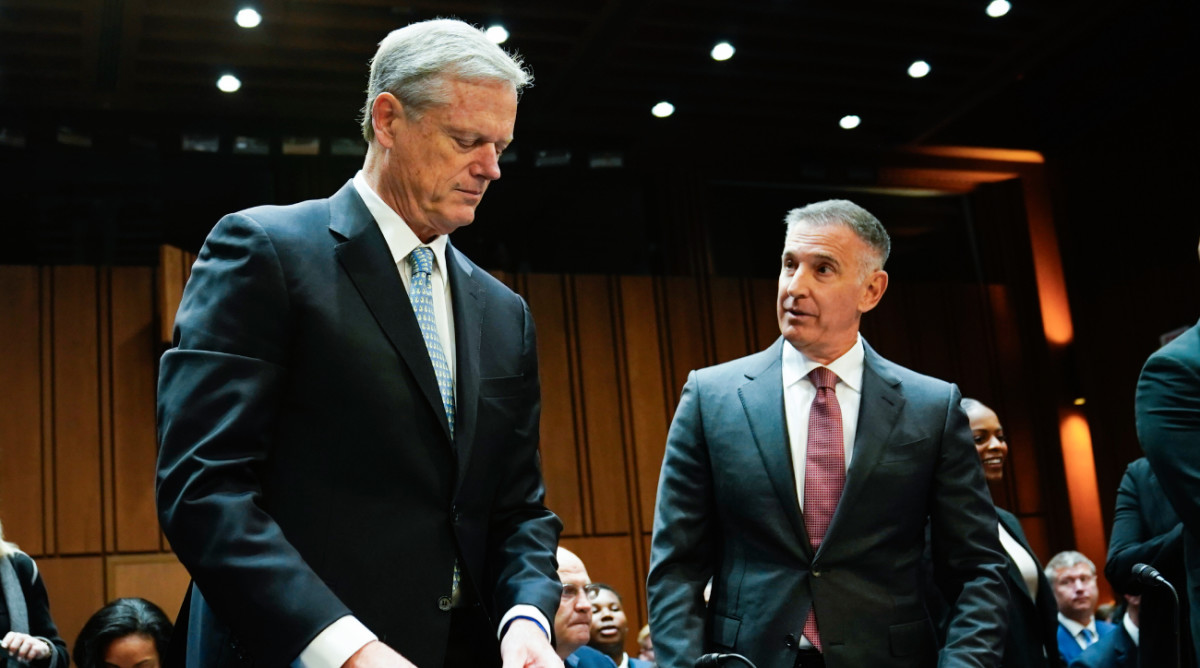
CSC Blocks Collective NIL Deals, Sparks Antitrust Concerns originally appeared on Athlon Sports.
The College Sports Commission stunned athletic departments on Thursday by rejecting every donor-backed collective name-image-likeness deal that crossed its new NIL Go clearinghouse. Deloitte auditors ruled the contracts failed the “valid business purpose” standard, throttling the most popular off-campus payment channel just as revenue sharing begins. Compliance staffers at Power Five schools now face a backlog, recruits are in limbo and lawyers are watching closely for another antitrust test of athlete compensation limits. The decision arrives less than two weeks after Big 12 Media Days amplified concerns about NIL oversight and competitive balance across college football.
Advertisement

The College Football Playoff trophy is awarded to the national championAdam Cairns / USA TODAY NETWORK via Imagn Images
What the memo actually says
The three-page letter, first obtained by AP News and shared with Division I ADs, explains that outside deals of $600 or more must prove (1) market-rate pay and (2) a commercial objective beyond funneling cash to athletes. A collective-hosted meet-and-greet or merch drop designed only to refill its war chest flunks both tests. More than 1,500 deals cleared NIL-Go between June 11 and July 10, but dozens tied to collectives were denied for the same reason.
Why athletic departments are furious
For three years compliance directors told boosters to route support through collectives. Now, without advance guidance, those same deals trigger boiler-plate rejections and no clear appeal path, administrators told FOX Sports. Athletes who signed spring agreements are waiting on money that may never arrive, and schools fear recruiting promises could unravel.
Advertisement
Déjà vu: another squeeze on athlete pay
The timing feels familiar. As soon as the collective model finally gave athletes real leverage, a new governing body narrowed the lane. Schools can share up to $20.5 million a year with athletes under last month’s House settlement, but that cap remains well below true market value for football and men’s basketball stars. When regulators shut the most efficient outside-payment system without offering a realistic alternative, they invite the same antitrust arguments the NCAA just settled at enormous cost.
The legal fault lines
-
Restraint of trade. Courts have repeatedly ruled that amateurism claims do not justify wage caps. A blanket ban on collective funding looks like a horizontal agreement among competitors (schools) to hold compensation down.
-
Lack of due process. The CSC did not publish detailed guidance in advance, then penalized parties for breaking rules they could not see. Judges rarely tolerate retroactive enforcement in labor markets.
-
Competitive balance myths. Collectives emerged precisely because different schools have wildly different donor bases. Wiping them out will not create parity; it merely pushes money under the table again, which undermines the CSC’s own transparency goals.
How this could be fixed before lawyers get involved
-
Publish a public rubric with dollar ranges and sample activations so schools can structure deals correctly the first time.
-
Create a 60-day grace period for contracts executed in good faith before July 10 so athletes are not caught in paperwork purgatory.
-
Fast-track low-dollar renewals while reserving deeper reviews for six-figure or first-time agreements.
-
Add an independent athlete ombudsperson empowered to challenge denials and speed up stalled payments.
Advertisement
Bottom line
Regulators insist they are cleaning up abuses, but their first sweeping move guts the only mechanism that matched athletes with meaningful outside money. Unless the CSC pairs the “valid business purpose” doctrine with clear rules and timely approvals, the sport is headed for another courtroom showdown that history suggests the gatekeepers will lose.
For a deeper look at how aggressive oversight is already reshaping the space, read “Florida State Under Fire for NIL Era’s Dirty Secret” right here on Athlon.
This story was originally reported by Athlon Sports on Jul 11, 2025, where it first appeared.
-

 Technology2 weeks ago
Technology2 weeks agoPet fitness and wellness trends for a healthier and happier dog
-

 College Sports2 weeks ago
College Sports2 weeks agoWAC to Rebrand to UAC, Add Five New Members in 2026
-

 Motorsports2 weeks ago
Motorsports2 weeks agoWhy Cosmetics are Making Up for Lost Time in Women’s Sports
-

 College Sports3 weeks ago
College Sports3 weeks agoAlabama Basketball
-

 Professional Sports3 weeks ago
Professional Sports3 weeks agoFrancis Ngannou sends Dana White a message following Jon Jones' shock UFC retirement
-

 College Sports2 weeks ago
College Sports2 weeks agoA new era of Dickinson hockey begins behind the bench – The Dickinson Press
-
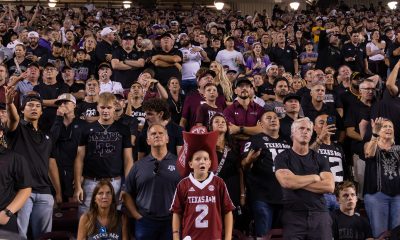
 Sports3 weeks ago
Sports3 weeks agoSEC Conference imposing a fine will create the opposite effect.
-

 Health2 weeks ago
Health2 weeks agoFlorida assault survivor shares hope for change with new mental health law
-

 Motorsports2 weeks ago
Motorsports2 weeks agoNASCAR This Week – Patriot Publishing LLC
-
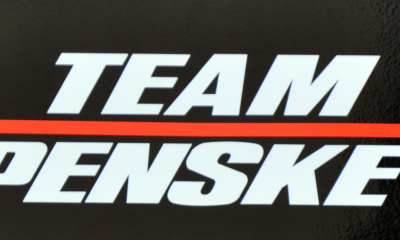
 Motorsports1 week ago
Motorsports1 week agoTeam Penske names new leadership


































